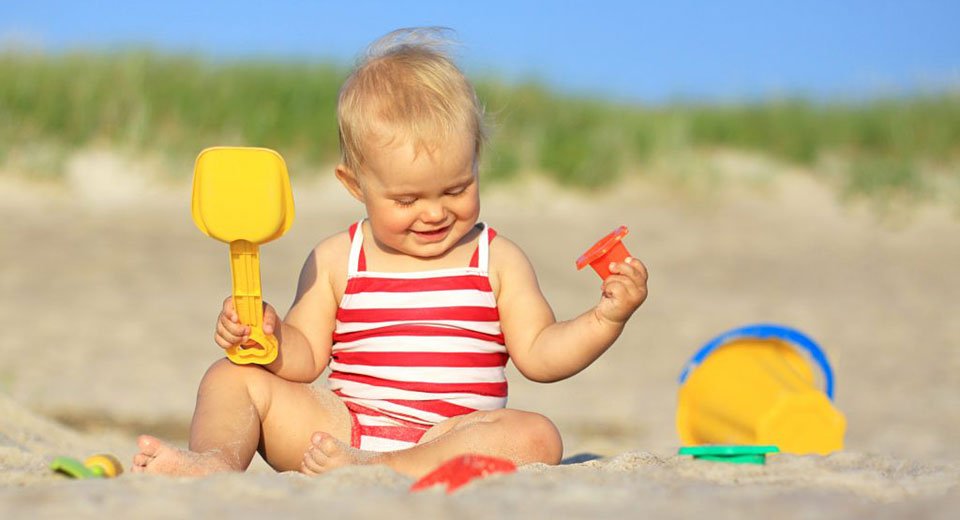Beach basics for babies
A family trip to the beach is always fun, but infants and toddlers need special care to protect them from sun, heat and water. And some kids are just too young and delicate for a beach trip, said Falmouth pediatrician Giannina Tierney, MD. Children under 6 months should be kept out of the sun, she said.
“I tell parents with a newborn, it’s not going to be a beach summer for you,” said, Dr. Tierney, whose practice is located at Bramblebush Pediatrics.
Infants have thinner skin, less melanin (pigment) and more surface area in relation to body volume than older children and adults. These factors make them more susceptible to sun damage and dehydration.
Dr. Tierney cited a study published in Pediatrics that says evidence indicates “intense and intermittent” exposure to the ultraviolet radiation in sunlight during childhood and adolescence is linked to development of two types of skin cancer: melanoma and basal cell carcinoma.
The study also says the thinner skin of infants under 6 months may make it more likely to absorb chemicals in sunscreens, and the safety of sunscreens on newborns has not been adequately tested.
However, the American Academy of Pediatrics has recommended that low amounts of sunscreen can be applied to small areas, such as the hands and face, if they are not covered by clothing or hats. Clothing should be tightly woven and loose fitting and hats or caps should have brims and preferably, a flap that drapes over the back of the neck, Dr. Tierney said.
For children older than 6 months, she recommends using a sunscreen that blocks both UVA and UVB rays, resists washing off in water and sweat, has an SPF of 15 or higher, and is not a combination sunscreen and insect repellent, which she said is less effective. Dr. Tierney also advises parents to avoid formulations that contain PABA, as it is not water-resistant, or oxybenzone, which, she said, can have hormonal properties. She suggested skipping scented products because they contain alcohol and can dry the skin.
“Apply it (sunscreen) a half-hour before going to the beach” she said. “Put it on every two hours.”
A half-ounce per application is adequate for infants, Dr. Tierney said. Older children need one ounce per application. Reapply after exercising or swimming, the AAP recommends. “You need at least a 10-ounce bottle if going to the beach,” she said.
Sunblock made with titanium oxide or zinc oxide can also be used to prevent burns, she said.
Other advice from Dr. Tierney:
- Avoid going to the beach between 10 a.m. and 4 p.m., when the sun is strongest
- Be aware that both water and sand reflect the sun’s burning rays, so that shade alone may not be enough protection
- Buy sunglasses made for infants and toddlers that protect their eyes from UVA and UVB rays.
“Most parents are very good about sunscreen,” Dr. Tierney said. “The thing I still see is teenagers tanning.”
Playing in summer heat can dehydrate children, so keep them healthy by supplying plenty to drink, Dr. Tierney said. She recommended water and sports drinks.
Whether at the beach or a pool, never leave young children unattended, Dr. Tierney said.
“Be at arm’s length, so you can grab them,” if swimming with your child, she said. “Don’t turn your back on them.”
Even small inflatable kiddie pools pose a danger to infants, who have weak limbs and large heads.
“They fall over into it,” Dr. Tierney said, and can drown.
Inflatable water wings can’t replace a life jacket, Dr. Tierney said. “They give a false sense of safety.”
Ticks and mosquitoes can put a bite into your beach day, plus they can spread illnesses, such as West Nile virus and Lyme disease. Dr. Tierney said the pediatricians used to caution about the use of insect repellents containing DEET, but the risk of disease has changed their position to favoring its use. Dr. Tierney urged avoiding repellents with high concentrations of DEET.
According to the federal Food and Drug Administration, DEET should not be used on children younger than 2 months, and oil of lemon eucalyptus products should not be used on children under 3 years. The FDA also recommends that sunscreen/insect repellent combinations products containing DEET should not be reapplied because that could increase the lotion’s potential chemical toxicity.
For further suggestions on how to keep children safe in the sun and water this summer, see tips from the AAP at healthychildren.org.
